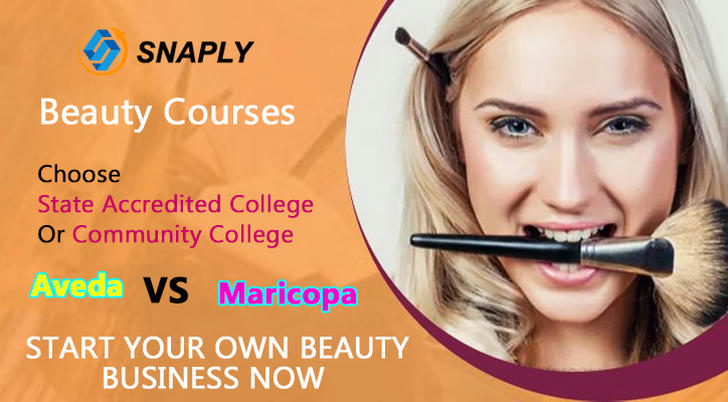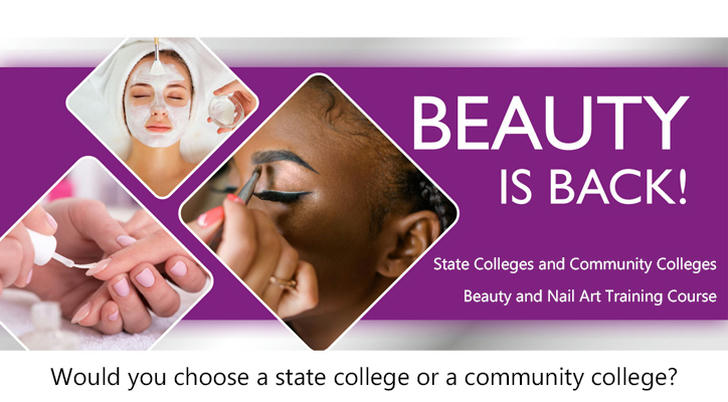💇♀️ Cosmetology & Nail Training Program Comparison Guide: State-Licensed Beauty Schools vs. Community Colleges
Cosmetology blends art with technique, covering hair, nails, skincare, and salon management. In the U.S., your training path—state-licensed beauty school or community college —can shape your career. This guide compares both options in terms of curriculum, training style, costs, and career outlook to help you choose wisely.

✂️ State-Licensed Beauty Schools: High Standards, Hands-On Focus
Schools like the Aveda Arts & Sciences Institute follow strict curriculum standards aligned with state licensure requirements. These programs focus on technical skills, legal knowledge, and professional ethics, offering real-world salon training to master hair design, coloring, nail care, skincare, hygiene, and business skills.
📚 Core Curriculum Includes:
- Haircutting and Hairstyling Techniques
- Hair Coloring, Perms, and Chemical Treatments
- Nail Care and Decorative Techniques
- Facial and Skincare Treatments
- State Regulations and Professional Ethics
- Salon Management, Client Communication, and Sales Skills
Program Length: Typically 1000–1600 hours (depending on state laws), after which students are eligible for the state cosmetology licensing exam.
💰 Tuition & Financial Support:
Accredited under federal financial aid, these schools may offer:
- Pell Grants (need-based aid)
- Federal Student Loans
- Veterans' Education Benefits
- Institutional Scholarships (e.g., Aveda’s eco-themed scholarships)
🏫 Community College Cosmetology Programs: Flexible, Career-Oriented
Programs like those at Maricopa Community Colleges prioritize practical, job-ready skills at a lower cost. Ideal for students looking to enter the workforce quickly, these programs cover hair care, styling, nail and skin treatments, and basic salon operations.
📘 Program Features:
- Fast-track Certificate Options (two semesters or less)
- Full-time training (around 32 hours/week)
- Combination of hands-on practice and theory
- Courses tailored to local job market needs
- Training in hygiene, safety standards, and client communication
💳 Cost & Scholarships:
- Tuition often under 25% of a four-year university
- 600+ scholarship programs available, covering books, transport, supplies
- Notable awards include the Maricopa Promise and Presidential Honors Scholarships
📈 Career Outlook: A Stable, Interactive Growth Sector
According to the U.S. Bureau of Labor Statistics (BLS), cosmetology, nail tech, and skincare professions are projected to grow steadily in the next five years:
| Career Path | Projected Annual Growth | Avg. Salary (AZ) |
|---|---|---|
| Hairstylists | 8% | $40,660 |
| Nail Technicians | 10% | $35,340 |
| Skincare Specialists | 9% | $39,130 |
Growing demand for personalized styling, skincare, and premium services makes licensed professionals with practical experience and business skills highly desirable. Many pursue careers as freelance stylists, brand educators, salon managers, or business owners.
🏛️ State Licensing Requirements: Quick Comparison
Licensing rules vary by state but generally follow a similar structure. Here's a snapshot:
| State | Required Hours | Exam Format | Licensing Board |
|---|---|---|---|
| Arizona | 1600 | Written + Practical | Arizona Barbering & Cosmetology Board |
| California | 1000 | Written + Practical | California Board of Barbering and Cosmetology |
| Texas | 1000 | Written + Practical | Texas Dept. of Licensing and Regulation |
| New York | 1000 | Some Exemptions | NY Division of Licensing Services |
| Florida | 1200 | Written + Practical | Florida Board of Cosmetology |
Important Notes:
- Training must come from a state-approved institution
- Most states require applicants to be 16–17+ with a high school diploma or GED
- Salon internship hours may count toward training hours in some states
📝 How to Apply for a Cosmetology or Nail Program
Whether you’re applying to a beauty school or community college, the typical steps are:
1. Choose a Campus
Visit the official website to find campus locations and class schedules. Many offer day, evening, or weekend classes.
2. Apply Online
Submit an online application, which may include:
- High school diploma or GED
- Age verification (ID or passport)
- Personal statement or short interview (for some schools)
3. Apply for Financial Aid
Submit your FAFSA form for federal aid. Some schools also offer scholarship applications during the admissions process or through internal awards.
4. Wait for Admission
You’ll usually receive an offer within 2–4 weeks. Once admitted, register and choose your start date.
✅ Summary Comparison: Choose the Path That Fits Your Goals
| Comparison Criteria | State-Licensed Schools (e.g., Aveda) | Community Colleges (e.g., Maricopa) |
|---|---|---|
| Training Intensity | Skill-focused, brand-driven | Foundational, highly career-focused |
| Program Length | Typically 12–14 months | 1–2 semesters |
| Cost & Aid | Federal aid + scholarships | Flexible costs + wide range of scholarships |
| Career Opportunities | High-end salons, educators, startups | Local salons, self-employed, continuing ed. |
| Degree Recognition | Required for licensure | Transferable to associate or certification |
🎯 Start Your Journey Today
Beauty is not just an industry—it’s a lifestyle, a career, and a creative outlet that empowers both you and your clients.
Whether you’re passionate about skincare, nails, or hairstyling, now is the perfect time to act. With programs offered at community colleges and state-approved beauty schools, you can build a professional future without overwhelming costs or debt.
Many programs welcome beginners—ideal for recent graduates, career changers, or anyone eager for a hands-on profession with real impact.
🌟 Don’t wait for the perfect time—create it.
A cosmetology or nail technician program in your area and take the first step toward a flexible, fulfilling, and creative career.
Start today—your future clients are already out there. 💅💇♂️

State Accredited Colleges:Beauty training
